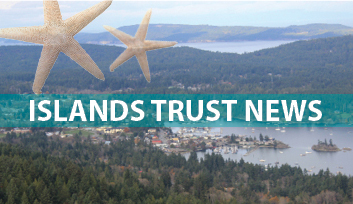Even a perceived lack of transparency has a real dollar cost, Islands Trust officials learned, as the annual number of Freedom of Information and Protection of Privacy Act (FOIPPA) requests to that body has doubled from three years ago, putting an increasingly large dent in the land use authority’s budget.
“This has been a big year for [FOIPPA] requests,” said director of legislative and information services David Marlor, addressing the Trust’s Executive Committee Wednesday, Nov. 20. “Currently we have 59 requests this calendar year.”
By comparison, Marlor said, back in 2021 and in the years before that the numbers were “all in the high 20s.”
And as the requests are highly time-sensitive, Marlor said, completing them requires three Islands Trust staff “to literally drop everything” to process them within statutory time limits.
“This is a service that governments are required to provide,” said Marlor. “There is the ability to charge fees for certain aspects [of the work], but the rate is very minimal, and there are a lot of exemptions –– we do not recover anywhere near the cost of processing, it’s something that we just have to cover.”
Discussion among Executive Committee members made it clear at least some FOIPPA requests have come to staff from trustees themselves. Director of planning services Stefan Cermak confirmed a recent request from an unnamed trustee had been perhaps overbroad.
“[There was] a request for ‘everything you have about x, y and z’,” said Cermak. “And ‘everything’ is a deep dive of staff resources. We forwarded as much information as they had available.”
Interim CAO Julia Mobbs said under FOIPPA legislation, “everything” included email records and even staff notes.
“These are public records,” said Mobbs, “that are [all] required to be submitted.”
Marlor agreed that while such requests were certainly acceptable, it would be ideal to go back to the requesting person and ask for more specificity, such as date ranges. What would also help, he added, would be an update to the Trust’s software for records management.
“A lot of our records are in a warehouse,” he said. “We have to find the boxes, bring them here and manually go through them –– find the records, check them to protect privacy and then release them.”
A rise in FOIPPA requests is not unique to the Islands Trust; last year the Capital Regional District (CRD) reported a 13 per cent year-over-year increase in its numbers, as well as a corresponding workload jump. In response, the CRD began a two-year, $150,000 project to digitize its most requested documents –– in its case, building permits –– to streamline requests.
Marlor suggested whatever the organization could do from the outset to reduce the number of people feeling they needed to rely upon FOIPPA provisions to remain informed might be the most effective way to manage costs.
“Being as transparent as we can,” said Marlor, “and providing as much information to the public as possible.”

